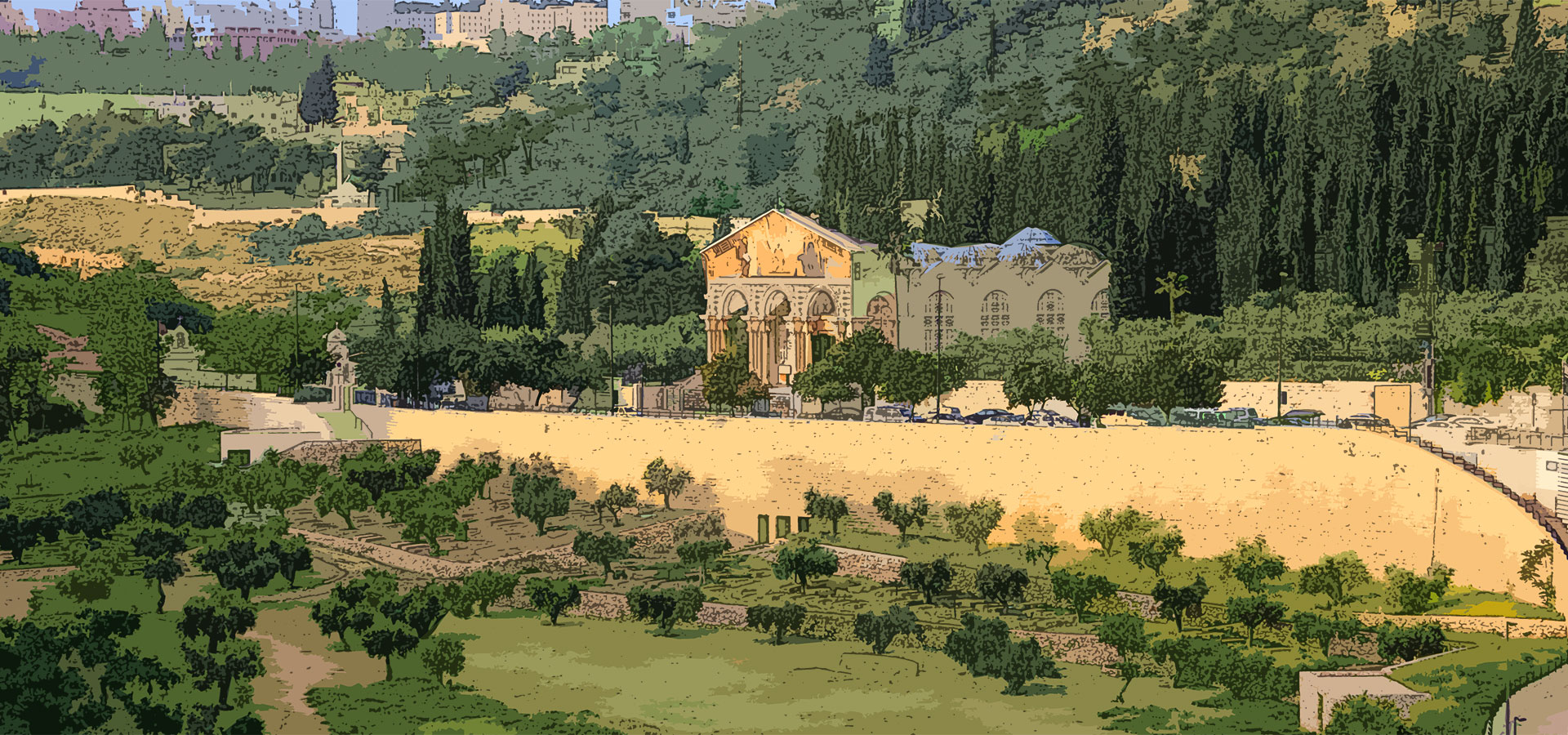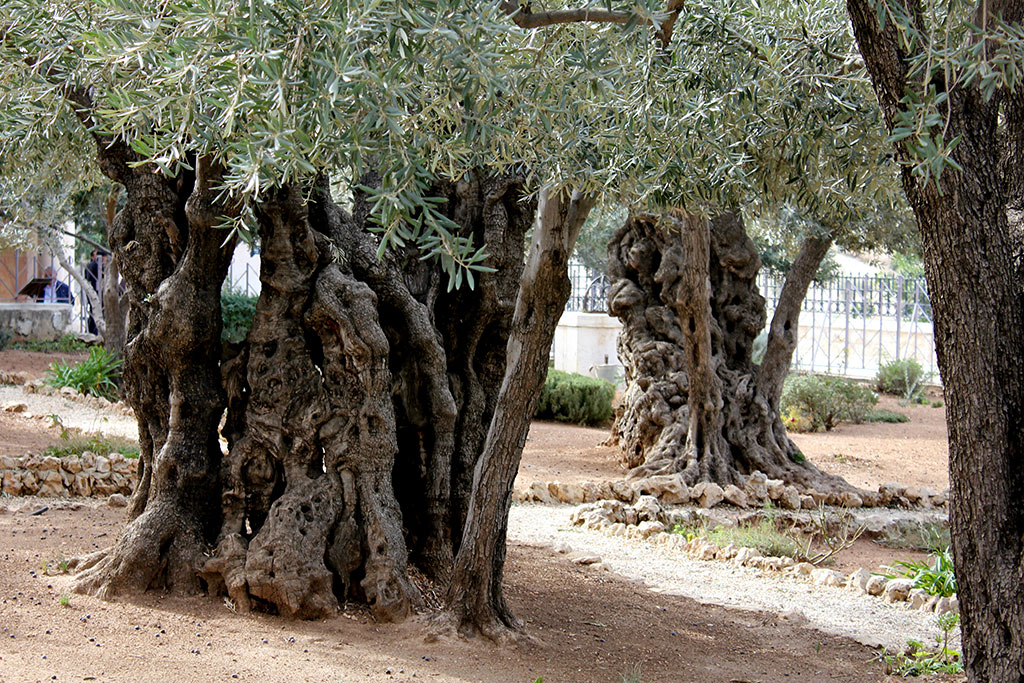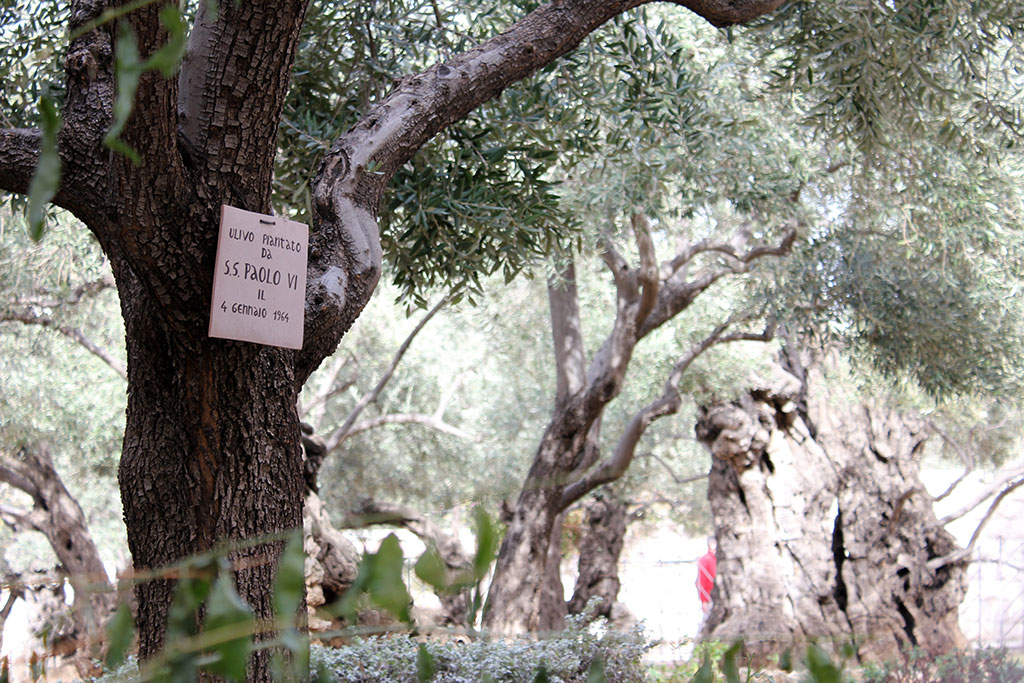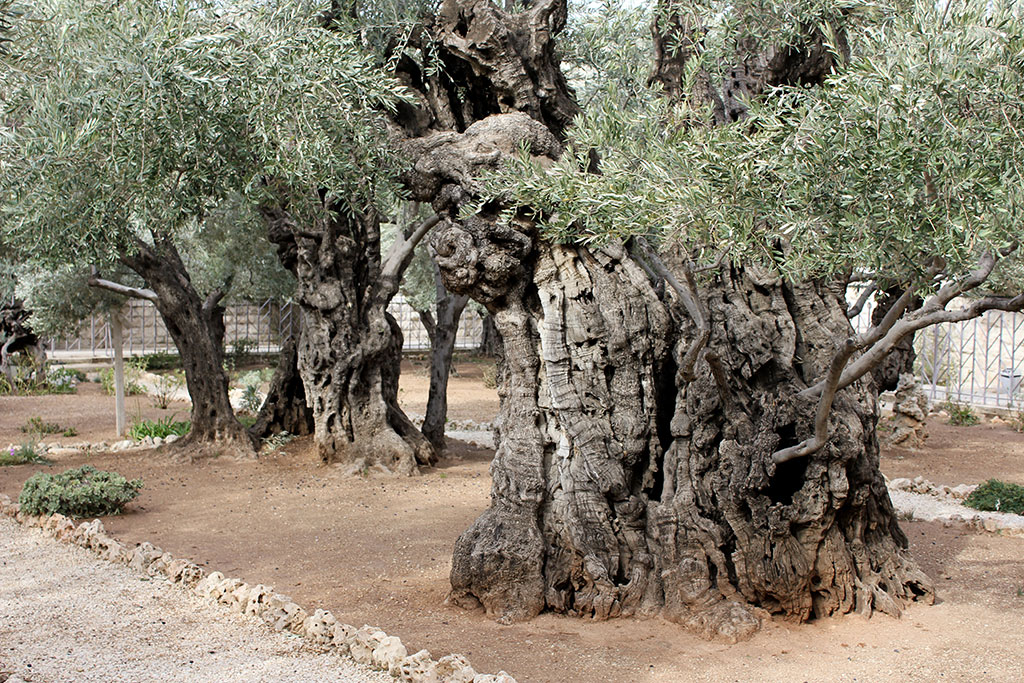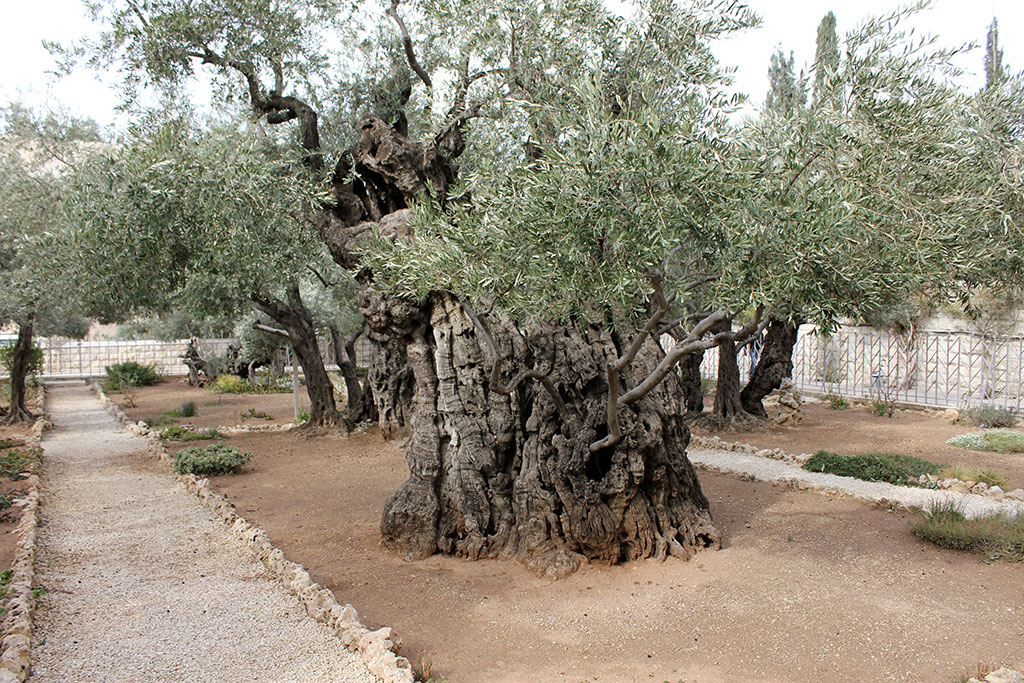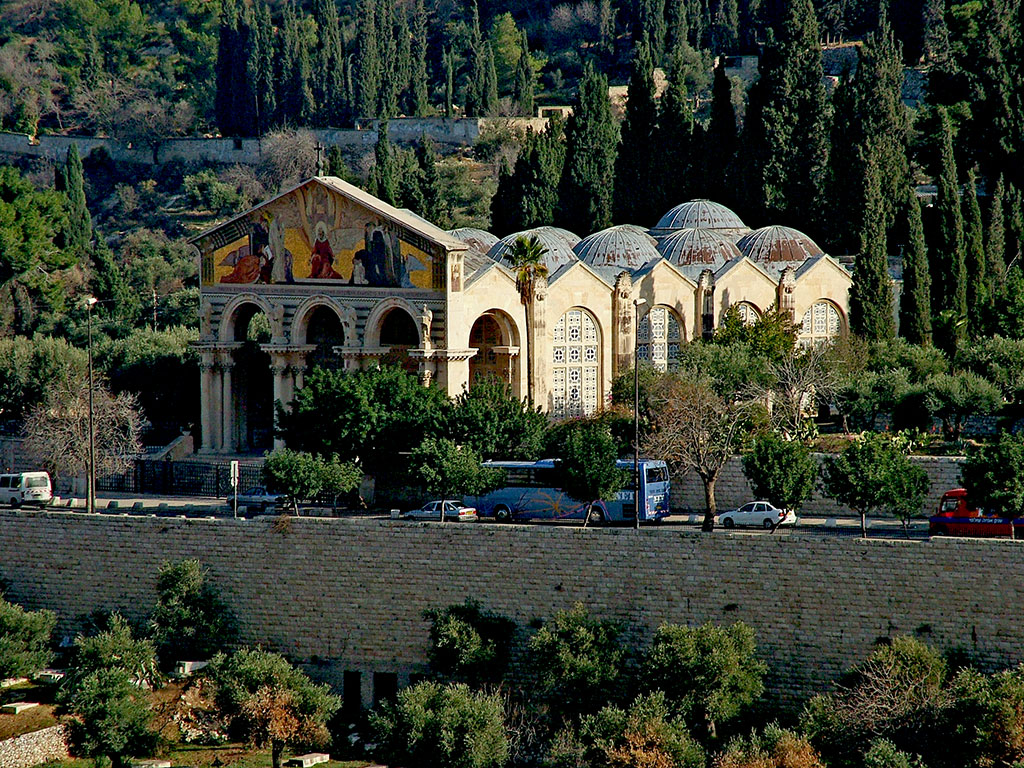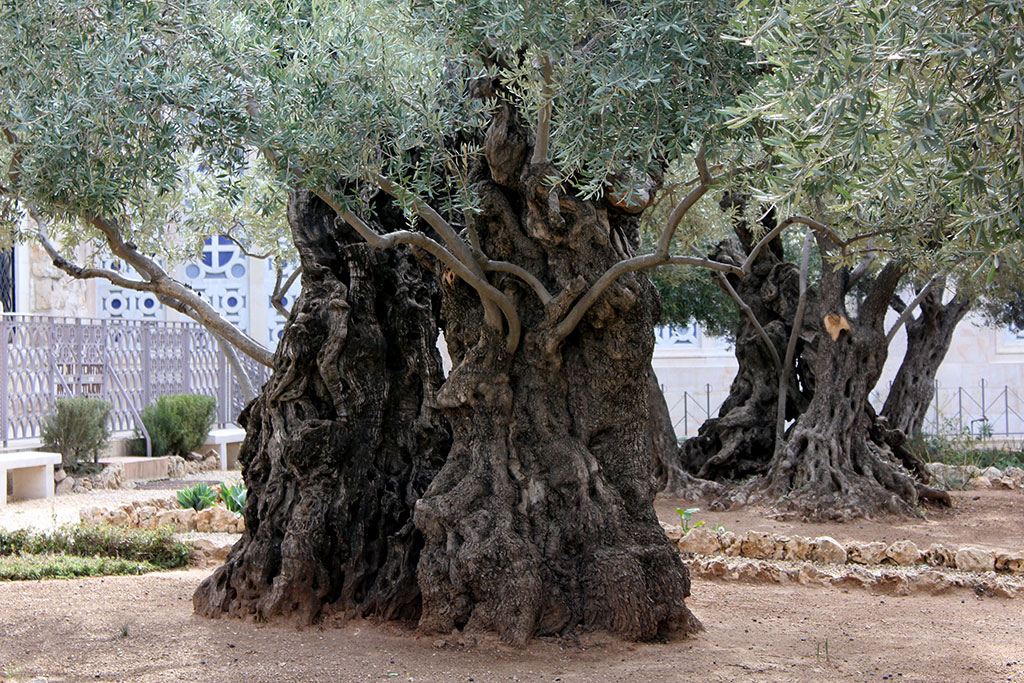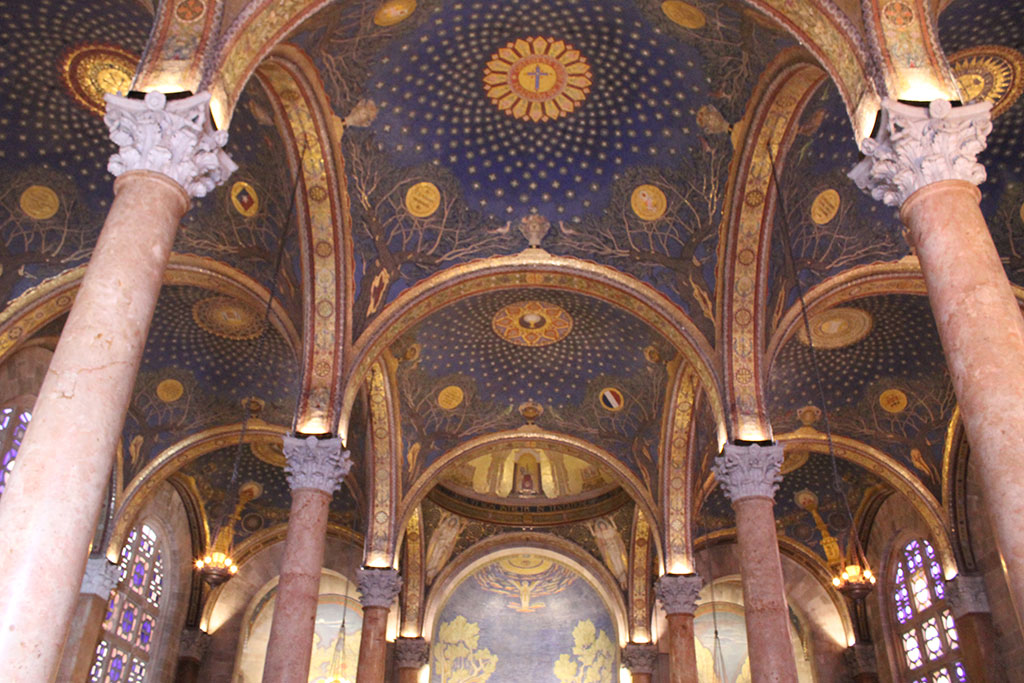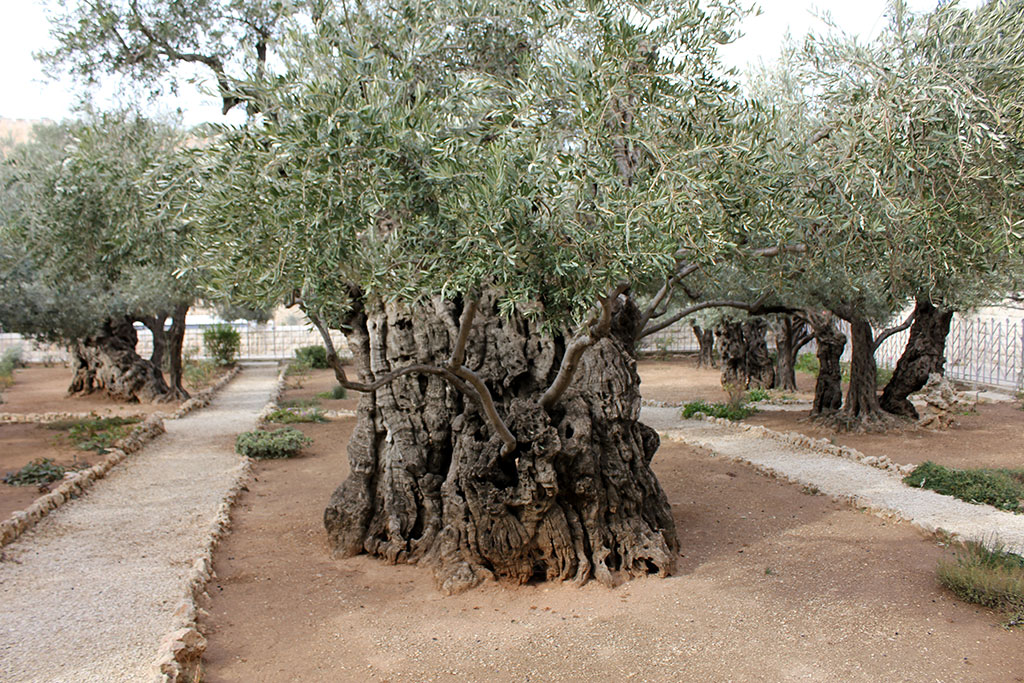Gethsemane means "oil press" in Aramaic. This incredible place was where one of the most important scenarios of the Gospels took place when Jesus and the disciples retired after the Last Supper. John described as a “garden” (κῆπος), while Luke (22:40) simply says “place” (τόπος). From John 18:1 it is evident that it was across the Kidron, and from Luke 22:39, that it was on the Mount of Olives.
The Gethsemane is located at the footstep of Mount of Olives, which overlooks Jerusalem and the Temple Mount from across the Kidron Valley and the Golden Gate.
“When Jesus had spoken these words, he went forth with his disciples over the brook Cedron, where was a garden, into the which he entered, and his disciples. And Judas also, which betrayed him, knew the place: for Jesus ofttimes resorted thither with his disciples. Judas then, having received a band of men and officers from the chief priests and Pharisees, cometh thither with lanterns and torches and weapons. Jesus therefore, knowing all things that should come upon him, went forth, and said unto them, Whom seek ye?They answered him, Jesus of Nazareth. Jesus saith unto them, I am he. And Judas also, which betrayed him, stood with them. As soon then as he had said unto them, I am he, they went backward, and fell to the ground. Then asked he them again, Whom seek ye? And they said, Jesus of Nazareth. Jesus answered, I have told you that I am he: if therefore ye seek me, let these go their way:That the saying might be fulfilled, which he spake, Of them which thou gavest me have I lost none. Then Simon Peter having a sword drew it, and smote the high priest’s servant, and cut off his right ear. The servant’s name was Malchus. Then said Jesus unto Peter, Put up thy sword into the sheath: the cup which my Father hath given me, shall I not drink it?Then the band and the captain and officers of the Jews took Jesus, and bound him,”
John 18:1–12 KJV
And he came out, and went, as he was wont, to the mount of Olives; and his disciples also followed him. And when he was at the place, he said unto them, Pray that ye enter not into temptation.And he was withdrawn from them about a stone’s cast, and kneeled down, and prayed, Saying, Father, if thou be willing, remove this cup from me: nevertheless not my will, but thine, be done.And there appeared an angel unto him from heaven, strengthening him. And being in an agony he prayed more earnestly: and his sweat was as it were great drops of blood falling down to the ground. And when he rose up from prayer, and was come to his disciples, he found them sleeping for sorrow, And said unto them, Why sleep ye? rise and pray, lest ye enter into temptation.
And while he yet spake, behold a multitude, and he that was called Judas, one of the twelve, went before them, and drew near unto Jesus to kiss him. But Jesus said unto him, Judas, betrayest thou the Son of man with a kiss?When they which were about him saw what would follow, they said unto him, Lord, shall we smite with the sword? And one of them smote the servant of the high priest, and cut off his right ear. And Jesus answered and said, Suffer ye thus far. And he touched his ear, and healed him. Then Jesus said unto the chief priests, and captains of the temple, and the elders, which were come to him, Be ye come out, as against a thief, with swords and staves?When I was daily with you in the temple, ye stretched forth no hands against me: but this is your hour, and the power of darkness.
Luke 22:39–53 KJV
Tradition, dating from the 4th century, has fixed on a place some 50 yds. E. of the bridge across the Kidron as the site. In this walled-in enclosure once of greater extent, now primly laid out with garden beds, by the owners — the Franciscans — are eight old olive trees supposed to date from the time of our Lord. They are certainly old, they appeared venerable to the traveler Maundrell more than two centuries ago, but that they go back to the time claimed is impossible, for Josephus states (BJ, VI, i, 1) that Titus cut down all the trees in the neighborhood of Jerusalem at the time of the siege. Some 100 yards farther N. is the “Grotto of the Agony,” a cave or cistern supposed to be the spot “about a stone’s cast” to which our Lord retired (Lk 22:41). The Greeks have a rival garden in the neighborhood, and a little higher up the hill is a large Russian church. The traditional site may be somewhere near the correct one, though one would think too near the public road for retirement, but the contours of the hill slopes must have so much changed their forms in the troubled times of the first and second centuries, and the loose stone walls of such enclosures are of so temporary a character, that it is impossible that the site is exact. Sentiment, repelled by the artificiality of the modern garden, tempts the visitor to look for a more suitable and less artificial spot farther up the valley. There is today a secluded olive grove with a ruined modern olive press amid the trees a half-mile or so farther up the Kidron Valley, which must far more resemble the original Gethsemane than the orthodox site.
“Gethsemane,” ISBE, paragraph 23844.

Jesus in Gethsemane
The place where Jesus offered an anguished prayer just before his betrayal and arrest there (Matt. 26:36; Mark 14:32). Its exact location is unknown, though it was probably somewhere near the Mount of Olives since all four Gospels agree that Jesus was betrayed and arrested on or near the Mount of Olives (Matt. 26:30; Mark 14:26; Luke 22:39; John 18:1). The name Gethsemane is from Aram. gaṯ šĕmānê, “oil press.” Both olive trees and presses for extracting the oil from the olives were common in the area, and it is probable that Gethsemane contained such a press.
Matthew and Mark name the place of Jesus’ prayer, betrayal, and arrest as Gethsemane and place it near the Mount of Olives. Luke does not name the place but has the events take place on the mount itself. John does not mention Jesus’ prayer, nor does he name the place of Jesus’ betrayal and arrest, though he locates it “across the Kidron valley” in a “garden” (John 18:1), and thus on the Mount of Olives. By combining the accounts of Jesus’ anguished prayer in the Synoptic Gospels with John’s account of his arrest in a garden, the traditional image of Jesus’ agony in the garden of Gethsemane was constructed.
Jesus in Gethsemane was interpreted as an appropriate contrast to Adam in Eden: the sinful disobedience of the first Adam in the garden of Eden was undone because of the prayerful obedience of the last Adam in the garden of Gethsemane (cf. Rom. 5:12-21). A similar development can be seen in Heb. 5:7-9, which mentions Jesus’ “prayers,” “godly fear,” and “obedience,” which led to his “being made perfect . . . the source of eternal salvation to all who obey him.”
“GETHSEMANE,” Eerdmans Dictionary of the Bible, 499.
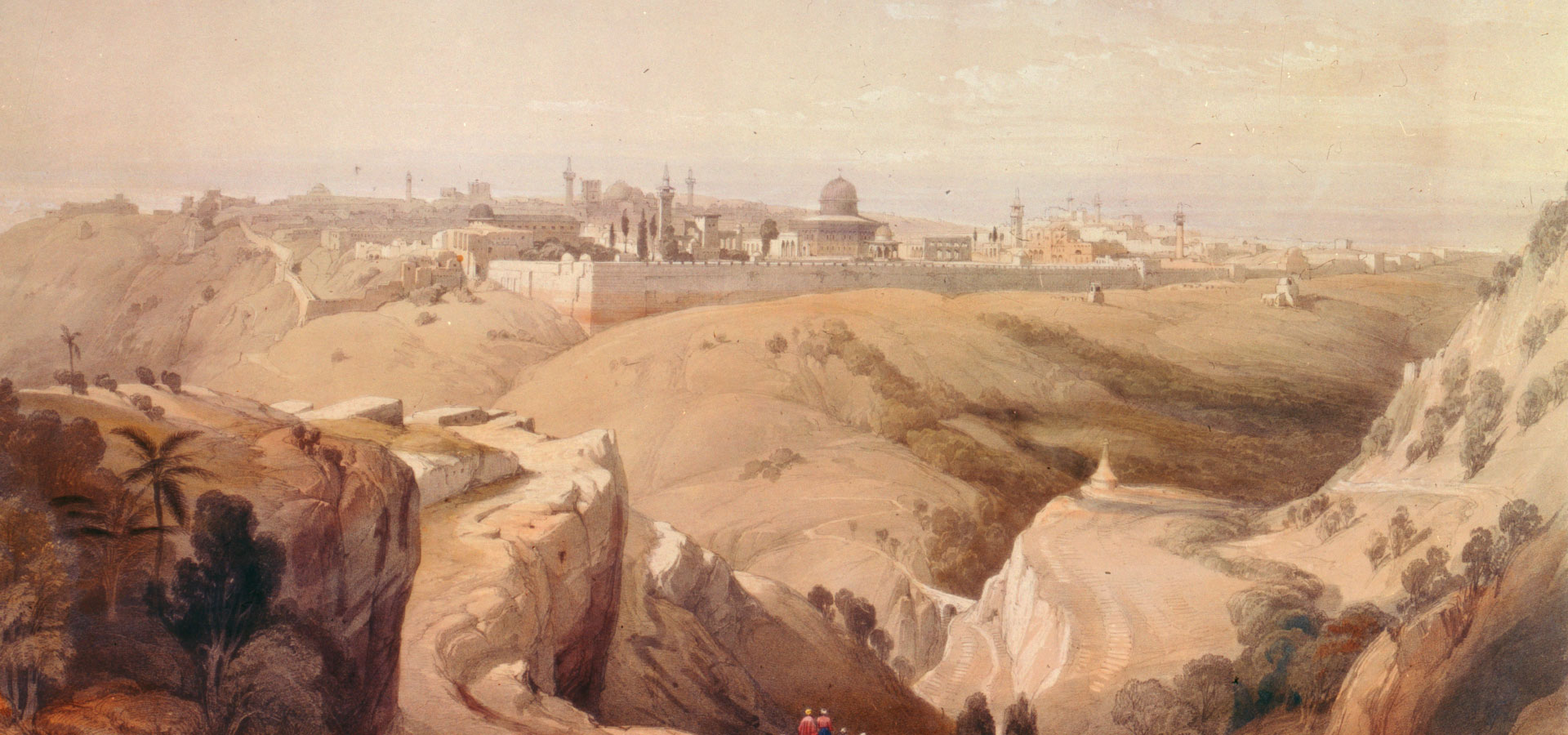
David on the Mount of Olives
And David went up by the ascent of mount Olivet, and wept as he went up, and had his head covered, and he went barefoot: and all the people that was with him covered every man his head, and they went up, weeping as they went up.
And one told David, saying, Ahithophel is among the conspirators with Absalom. And David said, O LORD, I pray thee, turn the counsel of Ahithophel into foolishness. And it came to pass, that when David was come to the top of the mount, where he worshipped God, behold, Hushai the Archite came to meet him with his coat rent, and earth upon his head: Unto whom David said, If thou passest on with me, then thou shalt be a burden unto me: But if thou return to the city, and say unto Absalom, I will be thy servant, O king; as I have been thy father’s servant hitherto, so will I now also be thy servant: then mayest thou for me defeat the counsel of Ahithophel. And hast thou not there with thee Zadok and Abiathar the priests? therefore it shall be, that what thing soever thou shalt hear out of the king’s house, thou shalt tell it to Zadok and Abiathar the priests. Behold, they have there with them their two sons, Ahimaaz Zadok’s son, and Jonathan Abiathar’s son; and by them ye shall send unto me every thing that ye can hear. So Hushai David’s friend came into the city, and Absalom came into Jerusalem.
And when David was a little past the top of the hill, behold, Ziba the servant of Mephibosheth met him, with a couple of asses saddled, and upon them two hundred loaves of bread, and an hundred bunches of raisins, and an hundred of summer fruits, and a bottle of wine. And the king said unto Ziba, What meanest thou by these? And Ziba said, The asses be for the king’s household to ride on; and the bread and summer fruit for the young men to eat; and the wine, that such as be faint in the wilderness may drink.
2 Samuel 15:30–16:2 KJV
